Leadership in Action: A Critical Evaluation of Management Practices
VerifiedAdded on 2023/06/18
|7
|1581
|467
Report
AI Summary
This report critically evaluates the role of a manager and their practices within an organization, drawing upon management theories such as Henry Fayol's Principles of Administrative Management and McGregor's Theory X and Theory Y. It discusses the responsibilities of a manager in achieving organizational goals, motivating employees, and implementing effective strategies. The report also reflects on the application of Fayol's principles, particularly the 'Unity of Command,' to address challenges within a company, improve productivity, and streamline workflows. Ultimately, the report concludes that effective management is crucial for achieving company objectives, and the implementation of relevant management theories can significantly enhance organizational performance.

Leadership in Action
Paraphrase This Document
Need a fresh take? Get an instant paraphrase of this document with our AI Paraphraser
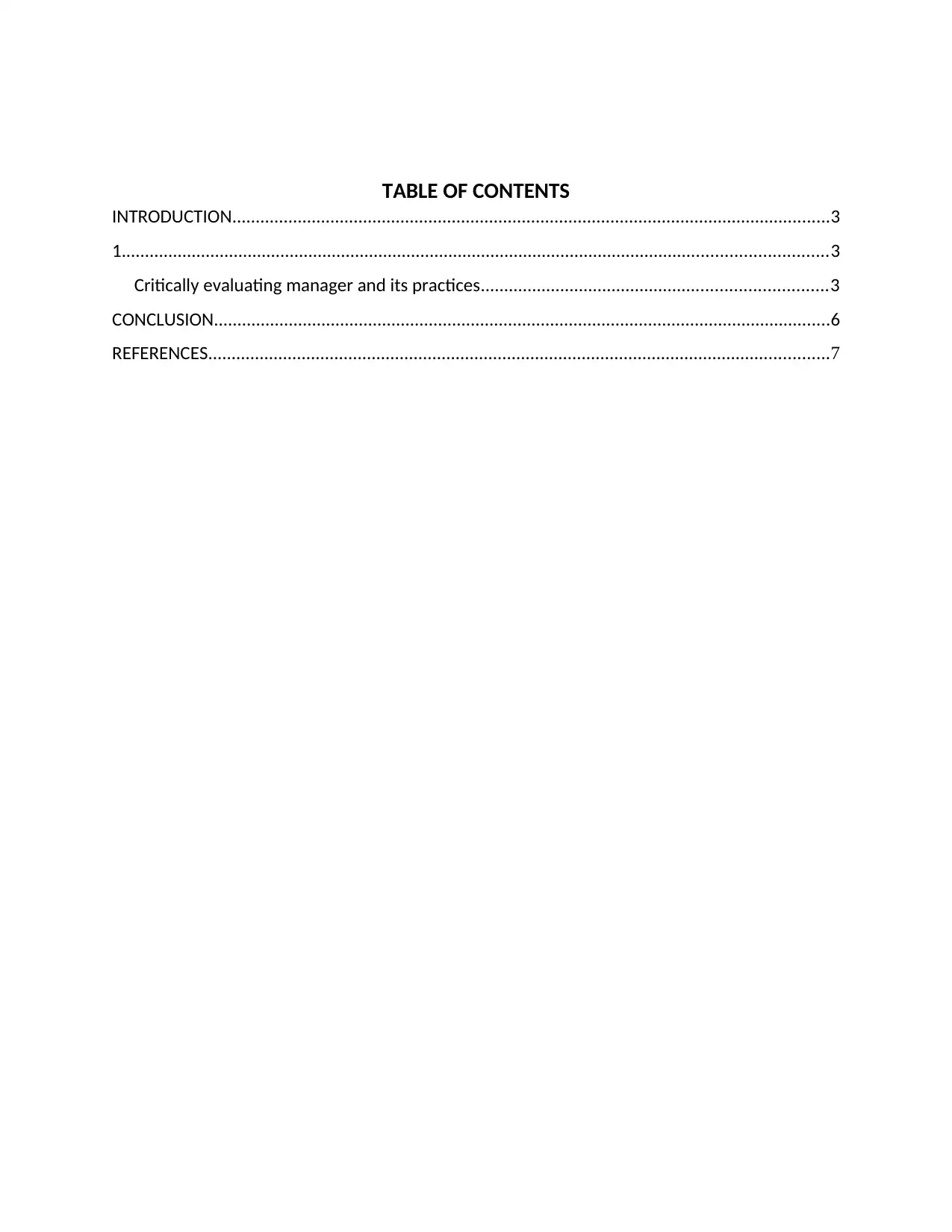
TABLE OF CONTENTS
INTRODUCTION................................................................................................................................3
1.......................................................................................................................................................3
Critically evaluating manager and its practices..........................................................................3
CONCLUSION....................................................................................................................................6
REFERENCES.....................................................................................................................................7
INTRODUCTION................................................................................................................................3
1.......................................................................................................................................................3
Critically evaluating manager and its practices..........................................................................3
CONCLUSION....................................................................................................................................6
REFERENCES.....................................................................................................................................7
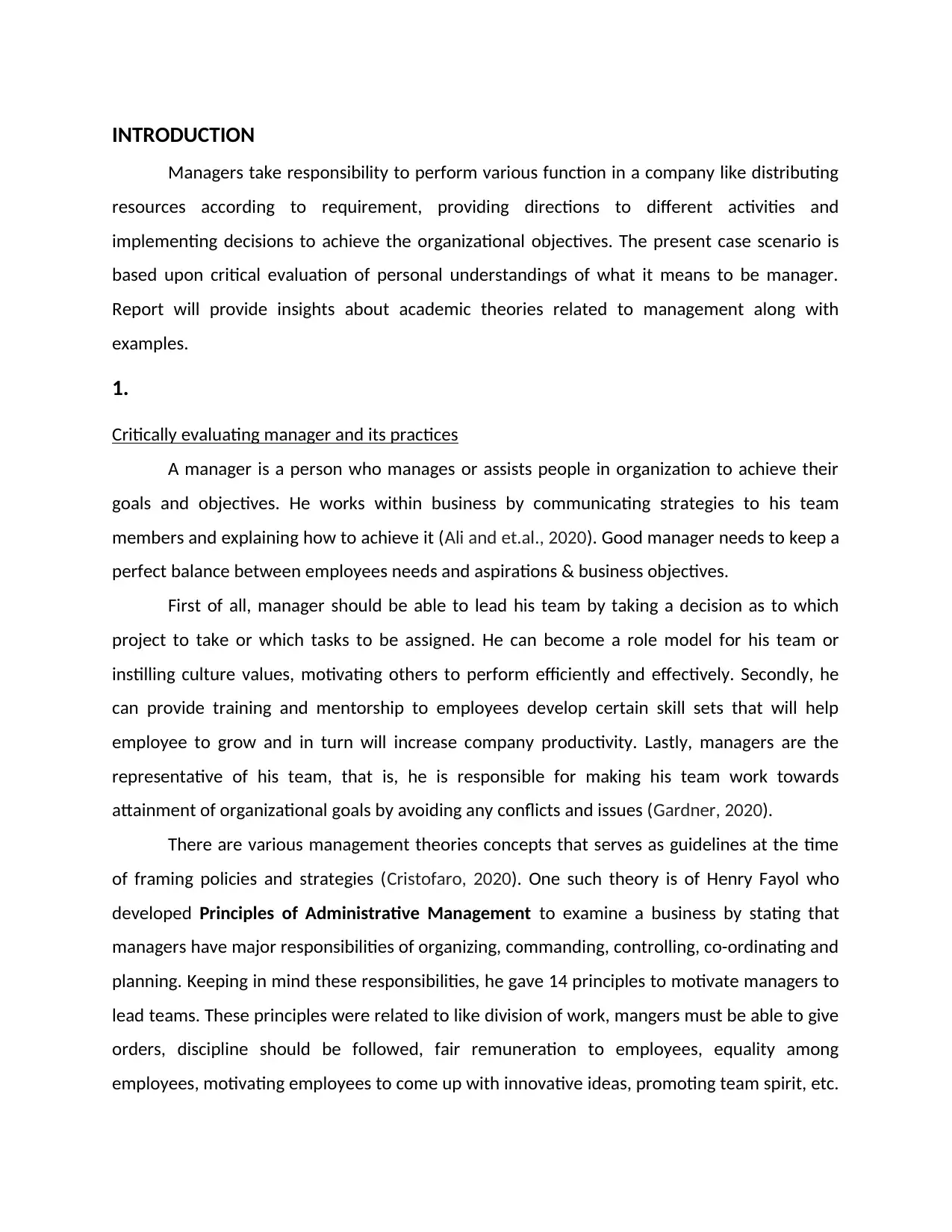
INTRODUCTION
Managers take responsibility to perform various function in a company like distributing
resources according to requirement, providing directions to different activities and
implementing decisions to achieve the organizational objectives. The present case scenario is
based upon critical evaluation of personal understandings of what it means to be manager.
Report will provide insights about academic theories related to management along with
examples.
1.
Critically evaluating manager and its practices
A manager is a person who manages or assists people in organization to achieve their
goals and objectives. He works within business by communicating strategies to his team
members and explaining how to achieve it (Ali and et.al., 2020). Good manager needs to keep a
perfect balance between employees needs and aspirations & business objectives.
First of all, manager should be able to lead his team by taking a decision as to which
project to take or which tasks to be assigned. He can become a role model for his team or
instilling culture values, motivating others to perform efficiently and effectively. Secondly, he
can provide training and mentorship to employees develop certain skill sets that will help
employee to grow and in turn will increase company productivity. Lastly, managers are the
representative of his team, that is, he is responsible for making his team work towards
attainment of organizational goals by avoiding any conflicts and issues (Gardner, 2020).
There are various management theories concepts that serves as guidelines at the time
of framing policies and strategies (Cristofaro, 2020). One such theory is of Henry Fayol who
developed Principles of Administrative Management to examine a business by stating that
managers have major responsibilities of organizing, commanding, controlling, co-ordinating and
planning. Keeping in mind these responsibilities, he gave 14 principles to motivate managers to
lead teams. These principles were related to like division of work, mangers must be able to give
orders, discipline should be followed, fair remuneration to employees, equality among
employees, motivating employees to come up with innovative ideas, promoting team spirit, etc.
Managers take responsibility to perform various function in a company like distributing
resources according to requirement, providing directions to different activities and
implementing decisions to achieve the organizational objectives. The present case scenario is
based upon critical evaluation of personal understandings of what it means to be manager.
Report will provide insights about academic theories related to management along with
examples.
1.
Critically evaluating manager and its practices
A manager is a person who manages or assists people in organization to achieve their
goals and objectives. He works within business by communicating strategies to his team
members and explaining how to achieve it (Ali and et.al., 2020). Good manager needs to keep a
perfect balance between employees needs and aspirations & business objectives.
First of all, manager should be able to lead his team by taking a decision as to which
project to take or which tasks to be assigned. He can become a role model for his team or
instilling culture values, motivating others to perform efficiently and effectively. Secondly, he
can provide training and mentorship to employees develop certain skill sets that will help
employee to grow and in turn will increase company productivity. Lastly, managers are the
representative of his team, that is, he is responsible for making his team work towards
attainment of organizational goals by avoiding any conflicts and issues (Gardner, 2020).
There are various management theories concepts that serves as guidelines at the time
of framing policies and strategies (Cristofaro, 2020). One such theory is of Henry Fayol who
developed Principles of Administrative Management to examine a business by stating that
managers have major responsibilities of organizing, commanding, controlling, co-ordinating and
planning. Keeping in mind these responsibilities, he gave 14 principles to motivate managers to
lead teams. These principles were related to like division of work, mangers must be able to give
orders, discipline should be followed, fair remuneration to employees, equality among
employees, motivating employees to come up with innovative ideas, promoting team spirit, etc.
⊘ This is a preview!⊘
Do you want full access?
Subscribe today to unlock all pages.

Trusted by 1+ million students worldwide
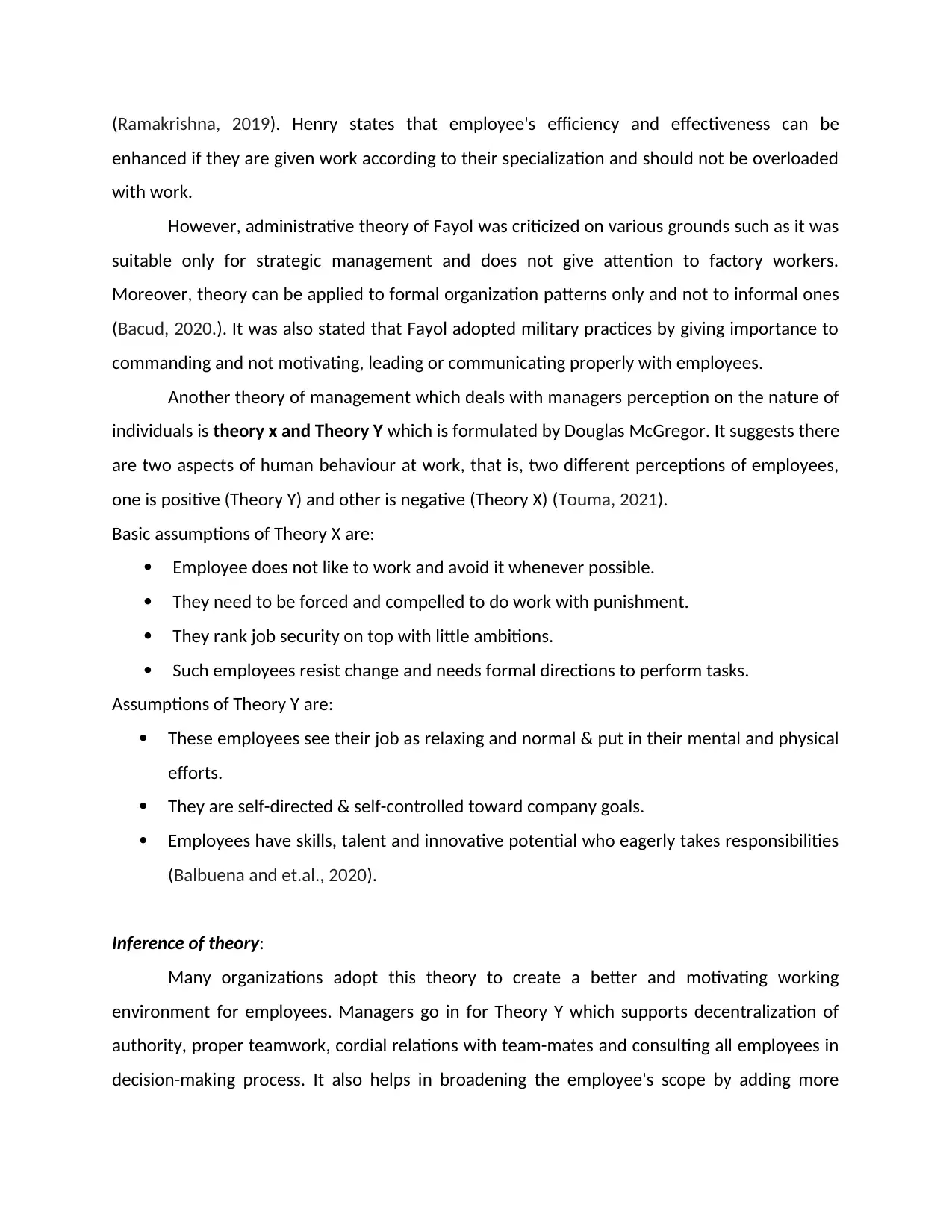
(Ramakrishna, 2019). Henry states that employee's efficiency and effectiveness can be
enhanced if they are given work according to their specialization and should not be overloaded
with work.
However, administrative theory of Fayol was criticized on various grounds such as it was
suitable only for strategic management and does not give attention to factory workers.
Moreover, theory can be applied to formal organization patterns only and not to informal ones
(Bacud, 2020.). It was also stated that Fayol adopted military practices by giving importance to
commanding and not motivating, leading or communicating properly with employees.
Another theory of management which deals with managers perception on the nature of
individuals is theory x and Theory Y which is formulated by Douglas McGregor. It suggests there
are two aspects of human behaviour at work, that is, two different perceptions of employees,
one is positive (Theory Y) and other is negative (Theory X) (Touma, 2021).
Basic assumptions of Theory X are:
Employee does not like to work and avoid it whenever possible.
They need to be forced and compelled to do work with punishment.
They rank job security on top with little ambitions.
Such employees resist change and needs formal directions to perform tasks.
Assumptions of Theory Y are:
These employees see their job as relaxing and normal & put in their mental and physical
efforts.
They are self-directed & self-controlled toward company goals.
Employees have skills, talent and innovative potential who eagerly takes responsibilities
(Balbuena and et.al., 2020).
Inference of theory:
Many organizations adopt this theory to create a better and motivating working
environment for employees. Managers go in for Theory Y which supports decentralization of
authority, proper teamwork, cordial relations with team-mates and consulting all employees in
decision-making process. It also helps in broadening the employee's scope by adding more
enhanced if they are given work according to their specialization and should not be overloaded
with work.
However, administrative theory of Fayol was criticized on various grounds such as it was
suitable only for strategic management and does not give attention to factory workers.
Moreover, theory can be applied to formal organization patterns only and not to informal ones
(Bacud, 2020.). It was also stated that Fayol adopted military practices by giving importance to
commanding and not motivating, leading or communicating properly with employees.
Another theory of management which deals with managers perception on the nature of
individuals is theory x and Theory Y which is formulated by Douglas McGregor. It suggests there
are two aspects of human behaviour at work, that is, two different perceptions of employees,
one is positive (Theory Y) and other is negative (Theory X) (Touma, 2021).
Basic assumptions of Theory X are:
Employee does not like to work and avoid it whenever possible.
They need to be forced and compelled to do work with punishment.
They rank job security on top with little ambitions.
Such employees resist change and needs formal directions to perform tasks.
Assumptions of Theory Y are:
These employees see their job as relaxing and normal & put in their mental and physical
efforts.
They are self-directed & self-controlled toward company goals.
Employees have skills, talent and innovative potential who eagerly takes responsibilities
(Balbuena and et.al., 2020).
Inference of theory:
Many organizations adopt this theory to create a better and motivating working
environment for employees. Managers go in for Theory Y which supports decentralization of
authority, proper teamwork, cordial relations with team-mates and consulting all employees in
decision-making process. It also helps in broadening the employee's scope by adding more
Paraphrase This Document
Need a fresh take? Get an instant paraphrase of this document with our AI Paraphraser
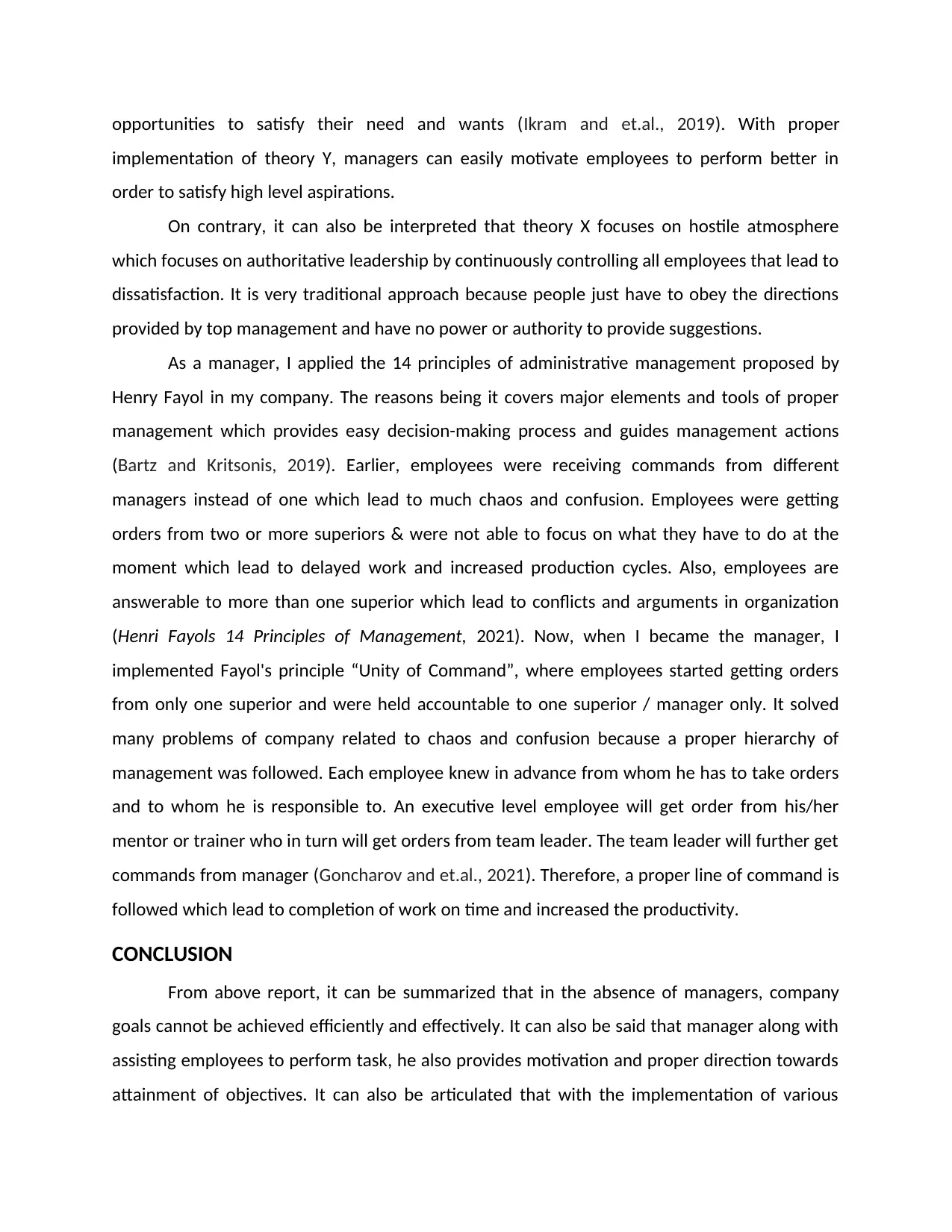
opportunities to satisfy their need and wants (Ikram and et.al., 2019). With proper
implementation of theory Y, managers can easily motivate employees to perform better in
order to satisfy high level aspirations.
On contrary, it can also be interpreted that theory X focuses on hostile atmosphere
which focuses on authoritative leadership by continuously controlling all employees that lead to
dissatisfaction. It is very traditional approach because people just have to obey the directions
provided by top management and have no power or authority to provide suggestions.
As a manager, I applied the 14 principles of administrative management proposed by
Henry Fayol in my company. The reasons being it covers major elements and tools of proper
management which provides easy decision-making process and guides management actions
(Bartz and Kritsonis, 2019). Earlier, employees were receiving commands from different
managers instead of one which lead to much chaos and confusion. Employees were getting
orders from two or more superiors & were not able to focus on what they have to do at the
moment which lead to delayed work and increased production cycles. Also, employees are
answerable to more than one superior which lead to conflicts and arguments in organization
(Henri Fayols 14 Principles of Management, 2021). Now, when I became the manager, I
implemented Fayol's principle “Unity of Command”, where employees started getting orders
from only one superior and were held accountable to one superior / manager only. It solved
many problems of company related to chaos and confusion because a proper hierarchy of
management was followed. Each employee knew in advance from whom he has to take orders
and to whom he is responsible to. An executive level employee will get order from his/her
mentor or trainer who in turn will get orders from team leader. The team leader will further get
commands from manager (Goncharov and et.al., 2021). Therefore, a proper line of command is
followed which lead to completion of work on time and increased the productivity.
CONCLUSION
From above report, it can be summarized that in the absence of managers, company
goals cannot be achieved efficiently and effectively. It can also be said that manager along with
assisting employees to perform task, he also provides motivation and proper direction towards
attainment of objectives. It can also be articulated that with the implementation of various
implementation of theory Y, managers can easily motivate employees to perform better in
order to satisfy high level aspirations.
On contrary, it can also be interpreted that theory X focuses on hostile atmosphere
which focuses on authoritative leadership by continuously controlling all employees that lead to
dissatisfaction. It is very traditional approach because people just have to obey the directions
provided by top management and have no power or authority to provide suggestions.
As a manager, I applied the 14 principles of administrative management proposed by
Henry Fayol in my company. The reasons being it covers major elements and tools of proper
management which provides easy decision-making process and guides management actions
(Bartz and Kritsonis, 2019). Earlier, employees were receiving commands from different
managers instead of one which lead to much chaos and confusion. Employees were getting
orders from two or more superiors & were not able to focus on what they have to do at the
moment which lead to delayed work and increased production cycles. Also, employees are
answerable to more than one superior which lead to conflicts and arguments in organization
(Henri Fayols 14 Principles of Management, 2021). Now, when I became the manager, I
implemented Fayol's principle “Unity of Command”, where employees started getting orders
from only one superior and were held accountable to one superior / manager only. It solved
many problems of company related to chaos and confusion because a proper hierarchy of
management was followed. Each employee knew in advance from whom he has to take orders
and to whom he is responsible to. An executive level employee will get order from his/her
mentor or trainer who in turn will get orders from team leader. The team leader will further get
commands from manager (Goncharov and et.al., 2021). Therefore, a proper line of command is
followed which lead to completion of work on time and increased the productivity.
CONCLUSION
From above report, it can be summarized that in the absence of managers, company
goals cannot be achieved efficiently and effectively. It can also be said that manager along with
assisting employees to perform task, he also provides motivation and proper direction towards
attainment of objectives. It can also be articulated that with the implementation of various
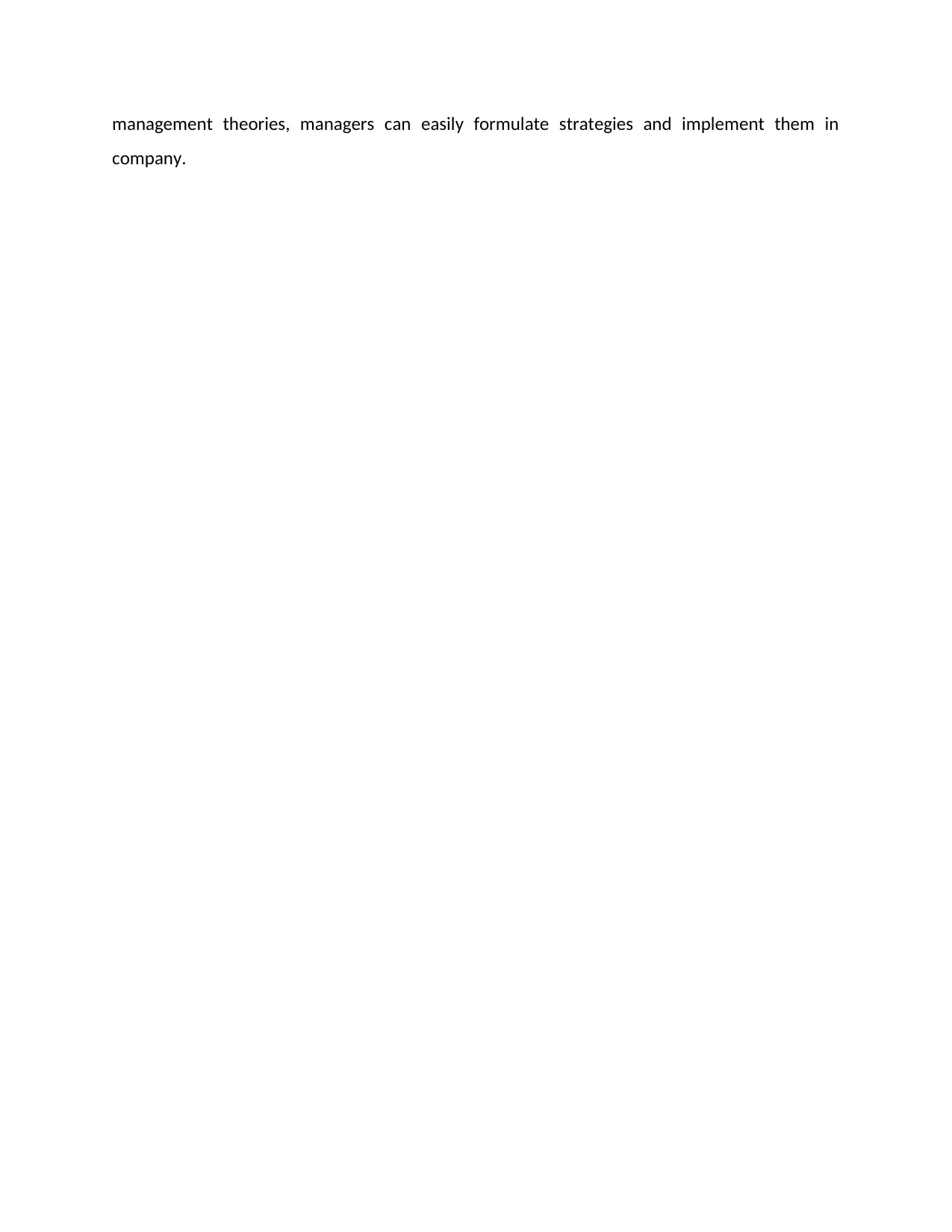
management theories, managers can easily formulate strategies and implement them in
company.
company.
⊘ This is a preview!⊘
Do you want full access?
Subscribe today to unlock all pages.

Trusted by 1+ million students worldwide
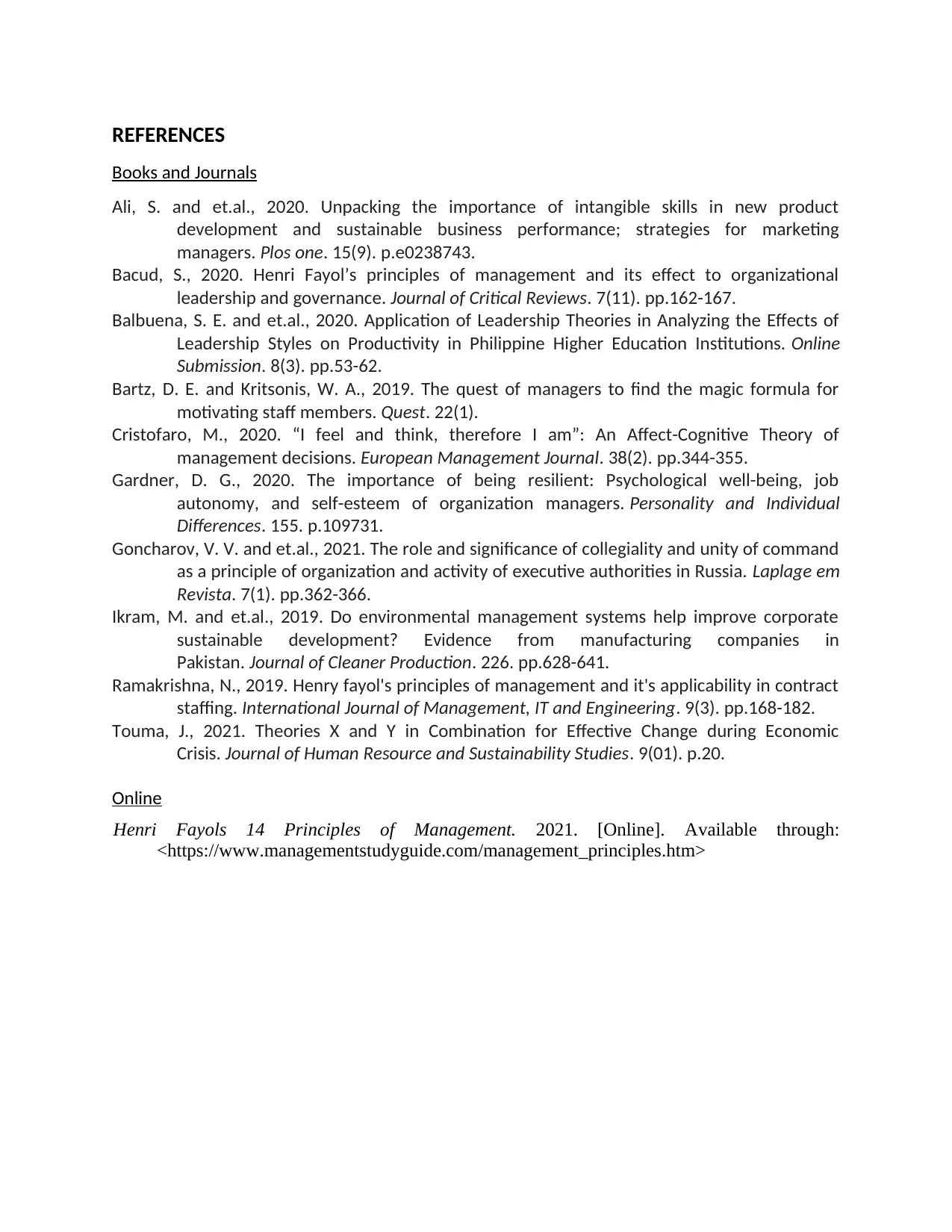
REFERENCES
Books and Journals
Ali, S. and et.al., 2020. Unpacking the importance of intangible skills in new product
development and sustainable business performance; strategies for marketing
managers. Plos one. 15(9). p.e0238743.
Bacud, S., 2020. Henri Fayol’s principles of management and its effect to organizational
leadership and governance. Journal of Critical Reviews. 7(11). pp.162-167.
Balbuena, S. E. and et.al., 2020. Application of Leadership Theories in Analyzing the Effects of
Leadership Styles on Productivity in Philippine Higher Education Institutions. Online
Submission. 8(3). pp.53-62.
Bartz, D. E. and Kritsonis, W. A., 2019. The quest of managers to find the magic formula for
motivating staff members. Quest. 22(1).
Cristofaro, M., 2020. “I feel and think, therefore I am”: An Affect-Cognitive Theory of
management decisions. European Management Journal. 38(2). pp.344-355.
Gardner, D. G., 2020. The importance of being resilient: Psychological well-being, job
autonomy, and self-esteem of organization managers. Personality and Individual
Differences. 155. p.109731.
Goncharov, V. V. and et.al., 2021. The role and significance of collegiality and unity of command
as a principle of organization and activity of executive authorities in Russia. Laplage em
Revista. 7(1). pp.362-366.
Ikram, M. and et.al., 2019. Do environmental management systems help improve corporate
sustainable development? Evidence from manufacturing companies in
Pakistan. Journal of Cleaner Production. 226. pp.628-641.
Ramakrishna, N., 2019. Henry fayol's principles of management and it's applicability in contract
staffing. International Journal of Management, IT and Engineering. 9(3). pp.168-182.
Touma, J., 2021. Theories X and Y in Combination for Effective Change during Economic
Crisis. Journal of Human Resource and Sustainability Studies. 9(01). p.20.
Online
Henri Fayols 14 Principles of Management. 2021. [Online]. Available through:
<https://www.managementstudyguide.com/management_principles.htm>
Books and Journals
Ali, S. and et.al., 2020. Unpacking the importance of intangible skills in new product
development and sustainable business performance; strategies for marketing
managers. Plos one. 15(9). p.e0238743.
Bacud, S., 2020. Henri Fayol’s principles of management and its effect to organizational
leadership and governance. Journal of Critical Reviews. 7(11). pp.162-167.
Balbuena, S. E. and et.al., 2020. Application of Leadership Theories in Analyzing the Effects of
Leadership Styles on Productivity in Philippine Higher Education Institutions. Online
Submission. 8(3). pp.53-62.
Bartz, D. E. and Kritsonis, W. A., 2019. The quest of managers to find the magic formula for
motivating staff members. Quest. 22(1).
Cristofaro, M., 2020. “I feel and think, therefore I am”: An Affect-Cognitive Theory of
management decisions. European Management Journal. 38(2). pp.344-355.
Gardner, D. G., 2020. The importance of being resilient: Psychological well-being, job
autonomy, and self-esteem of organization managers. Personality and Individual
Differences. 155. p.109731.
Goncharov, V. V. and et.al., 2021. The role and significance of collegiality and unity of command
as a principle of organization and activity of executive authorities in Russia. Laplage em
Revista. 7(1). pp.362-366.
Ikram, M. and et.al., 2019. Do environmental management systems help improve corporate
sustainable development? Evidence from manufacturing companies in
Pakistan. Journal of Cleaner Production. 226. pp.628-641.
Ramakrishna, N., 2019. Henry fayol's principles of management and it's applicability in contract
staffing. International Journal of Management, IT and Engineering. 9(3). pp.168-182.
Touma, J., 2021. Theories X and Y in Combination for Effective Change during Economic
Crisis. Journal of Human Resource and Sustainability Studies. 9(01). p.20.
Online
Henri Fayols 14 Principles of Management. 2021. [Online]. Available through:
<https://www.managementstudyguide.com/management_principles.htm>
1 out of 7
Related Documents
Your All-in-One AI-Powered Toolkit for Academic Success.
+13062052269
info@desklib.com
Available 24*7 on WhatsApp / Email
![[object Object]](/_next/static/media/star-bottom.7253800d.svg)
Unlock your academic potential
Copyright © 2020–2026 A2Z Services. All Rights Reserved. Developed and managed by ZUCOL.





